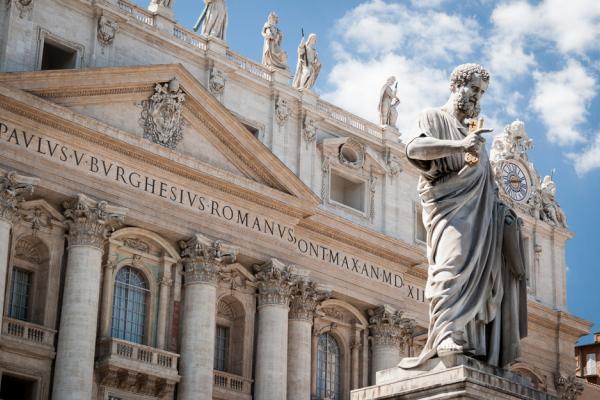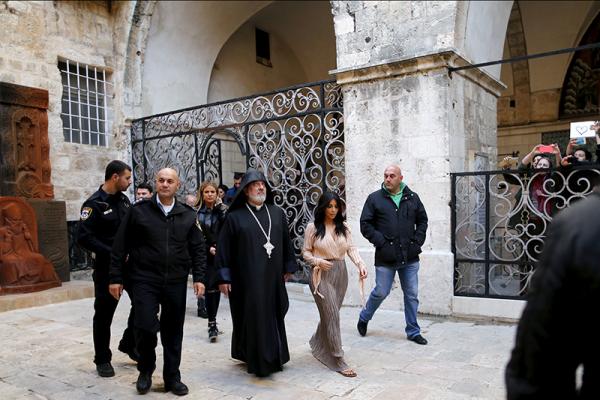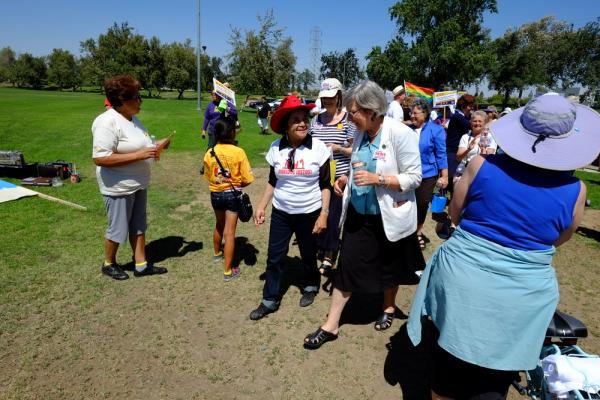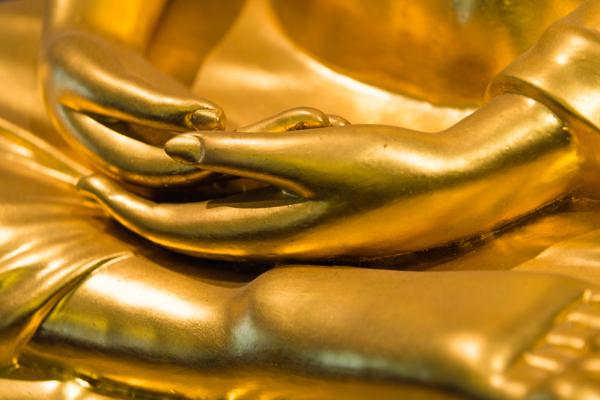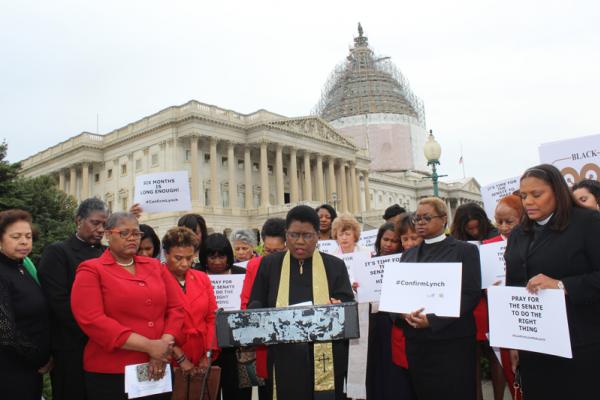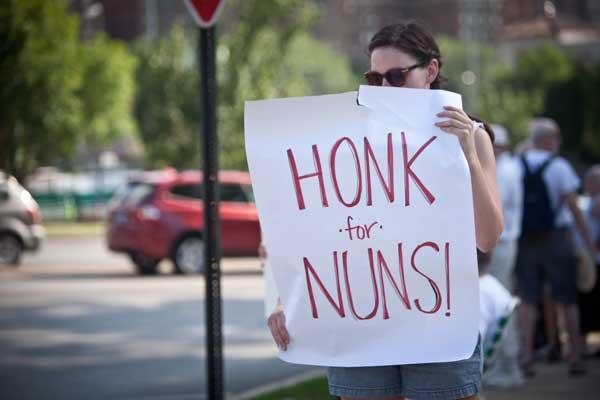The pieces of the religious puzzle that make up the USA Network’s biblical conspiracy action series Dig are beginning to fall into place, and the picture they are revealing is one of history — highlighted by a colorful streak of fiction.
Here be spoilers! Read on only if you are up-to-date with the 10-part series, or want to ruin it for yourself and others.
“Order of Moriah”
This secret religious order, supposedly dating from the Crusades, seems to be a product of the Dig writers’ imaginations. But, like many of the show’s fictional aspects, it is based on historical fact.
The Crusades, which mainly took place from 1095 to 1291, were an attempt by the Rome-based Catholic Church to retake the Holy Land — Jerusalem and its environs — away from its Muslim rulers.
During that time, the church founded several monastic religious orders whose members traveled to Jerusalem. Some fought with the armies, some cared for the wounded and sick. The most famous of these orders were the Knights Hospitallers, the Knights Teutonic, and the Knights Templar.
It is perhaps the Templars that the Order of Moriah is based on. Officially named “The Poor Fellow-Soldiers of Christ and of the Temple of Solomon,” the Knights Templar were anything but poor. They owned land from Rome to Jerusalem and were involved in finance throughout the Christian world. They loaned money to King Philip IV of France and the church.
A Mormon man and woman in a mixed-orientation marriage are objecting to their inclusion in a U.S. Supreme Court case filing because it argues that legalized gay marriage would demean marriages like theirs.
Josh and Lolly Weed’s names and statements are referenced in a “friend of the court” brief ahead of the April 28 arguments in a consolidated 6th Circuit Court of Appeals case, which many expect will legalize gay marriage nationwide.
The brief was filed April 3 on behalf of couples in mixed-orientation marriages — unions in which one partner is gay and the other is not — who oppose marriage equality.
The Weeds told The Salt Lake Tribune on April 14 they didn’t consent to be included in the filing, nor do they share its view.
Among the filing’s arguments: Constitutionally mandated same-sex marriages can exist only by “erasing, marginalizing and demeaning the same-sex attracted who live in man-woman marriages” and would send a “harmful message that it is impossible, unnatural, and dangerous for the same-sex attracted to marry members of the opposite sex.”
“What does that have to do with us at all?” asked Josh Weed, an openly gay man who has been married to a woman for 12 years.
“I feel no devaluation of my marriage status by having marriage equality.”
The Weeds, of Washington state, became the public face of Mormon mixed-orientation marriage in 2012, when they posted their story on Josh’s blog, joshweed.com. They do not advocate mixed-orientation marriages for others.
“My wife and I support marriage equality,” Josh Weed said.
The long and often contentious duel between the Vatican and the Leadership Conference of Women Religious came to an abrupt end on April 16. The probe of the umbrella group that represents most of the nation’s 50,000 nuns concluded with an amicable resolution that avoided serious sanctions for the sisters.
Here’s how the dispute played out:
April 2008: The Vatican’s Congregation for the Doctrine of the Faith taps Bishop Leonard Blair, then head of the Diocese of Toledo in Ohio, to carry out a doctrinal assessment of the LCWR.
December 2008: The Vatican’s office that oversees religious orders — the Congregation for Institutes of Consecrated Life and Societies of Apostolic Life — launches a parallel review of all women’s orders in the U.S. because of reports about “a certain secularist mentality that has spread among these religious families, perhaps even a certain ‘feminist spirit.’”
July 2010: Blair submits his eight-page initial assessment of the LCWR to the Vatican.
April 2012: The CDF announces a surprise crackdown on the LCWR, accusing the group of allowing views that have “serious theological, even doctrinal errors,” and conferences that featured “a prevalence of certain radical feminist themes incompatible with the Catholic faith.”
April 2012: The Vatican appoints Seattle Archbishop J. Peter Sartain, along with Blair and Bishop Thomas J. Paprocki of Springfield, Ill., to directly oversee an overhaul of the LCWR that would give the hierarchy the final say on the sisters’ statutes, speakers and published materials.
June 2012: After consulting the membership, the LCWR leadership responds by saying that the Vatican crackdown was based on “unsubstantiated” allegations and caused “scandal and pain” in the church. A week later, LCWR leaders meet with top Vatican doctrinal officials in Rome in what is called an atmosphere of “openness and cordiality.”
This has gotta be a first: Kim Kardashian is not in the picture.
But it’s happened, in Israel, on an ultra-Orthodox Jewish news website, which covered or blurred her face in a picture taken of her during her stopover in Jerusalem this week.
Kim and husband Kanye West had dinner on April 13 with Jerusalem Mayor Nir Barkat, but the picture of the three of them was altered.
It showed only Kanye and the mayor, with Kim’s face covered by a picture of a receipt or just blurred to the point of oblivion.
Nissim Ben Haim, an editor at the Kikar HaShabbat website, said April 15 they removed Kim because she is a “pornographic symbol” who contradicts ultra-Orthodox values, according to The Associated Press.
The website wasn’t too happy with Barkat, either, because he dined with the couple at a high-end but non-kosher restaurant, and supposedly the bill was was nearly $700.
In its article, the website referred to Kim as merely “West’s wife,” which must have been amusing to both.
Three Years After 'Radical Feminist' Charge, U.S. Catholic Sisters and Vatican Reach Peace Agreement
The conflicted and controversial three-year doctrinal investigation by the Vatican of U.S. Catholic sisters in the Leadership Conference of Women Religious has formally come to an end, according to a press release from the Vatican this morning and reports in the National Catholic Reporter.
“We are pleased at the completion of the Mandate which involved long and challenging exchanges of our understandings of and perspectives on critical matters of Religious Life and its practice," said Sr. Sharon Holland, IHM, president of LCWR.
She continued:
"Through these exchanges, conducted always in a spirit of prayer and mutual respect, we were brought to deeper understandings of one another’s experiences, roles, responsibilities, and hopes for the Church and the people it serves. We learned that what we hold in common is much greater than any of our differences.”
Conservative operators within the Vatican have been working for years to bring suspicion on communities of Catholic sisters in the U.S. In the past seven years, they succeeded in launching twin investigations into American nuns.
The first, launched in 2008, was a controversial and unprecedented "apostolic visitation" investigating the finances and communal practices of individual U.S.-based Catholic orders of women religious, representing tens of thousands of women. It ended in December 2014 with a formal backing down by the Vatican office from which it was launched. The final report, issued under Pope Francis, was released at a public press conference in Rome — also unprecedented — in which all those involved made clear statements about the process and emphasized a spirit of forbearance, mercy, and transparency.
The second, launched in April 2012, amounted to a hostile takeover of the Leadership Conference of Women Religious, which represents 80 percent of U.S. Catholic sisters and is the primary leadership governing body for U.S. Catholic women's orders. LCWR was accused by ultra-traditionalist Archbishop Levada of including "radical feminist themes" and fomenting "corporate dissent" from the church's teaching on human sexuality, among other things. Even though LCWR was founded in 1956 under the urging of Pope Pius XII, it was under Pope Benedict XVI that the doctrinal assessment took place.
Could Christianity's future lie in Buddhism's past? This is a possibility that's been haunting me lately, but in a good way, I think.
One big critique, understandably, of postmodern views on Christian spirituality is that there's too much time and energy spent deconstructing old systems and ways of thinking that need to be torn down or reimagined, while lacking the same effort to build up something more helpful — more Christ-like — in its place.
This is true, and I'm as guilty of it as anyone. In my current spiritual practices as part of the current year I'm calling “My Jesus Project,” I'm trying to more fully understand what we mean when we talk about following Jesus. So it might seems strange to some that I would look to Buddhism for help in rebuilding my daily walk along the path of Christ.
Author and monastic Thich Nhat Hanh wrote a book years ago called Living Buddha, Living Christ, that had a profound impact on me. At the time, I was “A-B-C,” or “anything but Christian.” I had been thrown out of my church of origin for asking too many questions, and up to that point, I assumed there was no way I could ever associate myself with Jesus or the Gospel again. Thankfully — if surprisingly — it was a Buddhist monk who reintroduced me to Jesus.
In his book, he draws many parallels between the life, teaching, and practices of Jesus and those of Siddhartha Gautama, later known as The Buddha after achieving enlightenment. For Jesus, I imagine a similar experience of enlightenment coming to him during his monastic retreat into the desert. And as I seek my own moments of illumination during My Jesus Project, it occurs to me that Buddhism has much to teach us about where we might take Christianity in the 21st century.
No Ego
One of the greatest weaknesses of modern Christianity has been the focus on the individual. This comes more from our individualistic culture than from Christianity itself. Though we focus on personal (often translated as sexual) sin, the idea of sin within the Hebrew Bible was more corporate. There was more of an interdependent, tribal culture, and as such, so were the shortcomings. We've also focused too much on personal salvation or a “personal relationship with Jesus Christ,” which has also led to such bastardized interpretations as the false gospel of personal prosperity.
In Buddhist practices, one must learn to let the self die, in a manner of speaking, in order to create a deeper, more meaningful relationship and interdependence with others and the rest of creation. This is actually more consistent with ancient Jewish and Christian thought than our modern, egocentric version of Christianity.
It was the means of agonizing humiliation and execution and has adorned the banners of armies through which some of the most brutal violence was perpetrated in history. It is a symbol worn by the faithful and sometimes the fashionable. It has famously been described as a stumbling block and foolishness. The cross is central to the Christian faith — but what does it mean? And how could this symbol of weakness also be a source of strength for followers of Christ?
As Christians ponder the mystery and meaning of the cross and Christ’s resurrection in this Easter season, I read Tony Jones’ new book, Did God Kill Jesus? which explores and analyzes various atonement theories through history and culture and considers whether the most famous — penal substitutionary atonement — is really the most accurate. Although Tony and I do not necessarily share the same views, I realized that our perspectives are not as far off as I had thought. I recently had the opportunity to interview him about the book and how his study and meditation of the cross has shaped his understanding of the crucifixion and what that can mean for the faithful.
(This interview has been edited for length and clarity.)
JV: You touch a bit on this in the book (but for those who might not read it), what do you believe are the theological and social implications of holding to a belief in penal substitutionary atonement? Could you elaborate on what you think those implications are? And do you think there can be anything redemptive or beautiful in Christians holding to a substitutionary atonement theory of the crucifixion?
Not many people traveling in southern Africa consider Venda in the northern Limpopo Province a worthy touristic or project partnership visit. For years visitors to the South African Development Community have seen this more isolated, beautiful mountainous area of northern South Africa as a shortcut to Kruger National Park or to/from Pretoria and Johannesburg en route to the wonders of the 1,000-year-old Great Zimbabwe ruin or majestic Victoria Falls.
Perhaps a quick stop was worthy on the Musina-Beitbridge border to photograph the “great, green, greasy Limpopo River” made famous by Rudyard Kipling’s “How The Elephant Got His Trunk.” Not much else would interrupt the dash on the N1, similar to America’s own Route 1 from Canada to Florida.
Big mistake! As I found out when saying ill-advisedly to our travelling companions that “there really is nothing to see or stop for in the area … and we do have an important dinner appointment in Pretoria.” The twofold result was a serious late night ”domestic” with my more adventurous and intuitive wife, Karen, and secondly, a necessary, more open-minded review of the unexplored albeit minimalist pages on the Venda Region section of the Rough Guide and Lonely Planet guidebooks. Alas the travel guides seemed to have the same misperception as my 30-year-old wisdom.
African-American women of faith joined other women and political leaders in a “pray-in” on April 15 to call on Republicans to quit delaying the confirmation of attorney general nominee Loretta Lynch.
“We’re standing before dead ears and asking you to open them up right now, God, that they might hear you,” prayed the Rev. Barbara Williams-Skinner , co-chair of the National African American Clergy Network.
“That they would wake up now from a dead sleep, unaware that America, Americans of all types and backgrounds, are united behind the fundamental concept of fairness.”
President Obama nominated Lynch, the U.S. attorney for the Eastern District of New York, in November, but her confirmation process has stalled on Capitol Hill.
In addition to prayers, the women leaders said they will start fasting until a decision is made, and they invited women of all backgrounds as well as men to fast, too. They are joining with the Rev. Al Sharpton’s National Action Network in a “ Confirm Lynch Fast .”
NAN Executive Director Janaye Ingram asked that participants contact Senate offices when they normally would be eating. Fasters were expected to abstain from food one day at a time and be replaced by others the next day.
Several congresswomen, including Democratic House Judiciary Committee members Reps. Sheila Jackson Lee of Texas and Judy Chu of California, stopped by the pray-in, and at least one pledged to fast.
The Vatican on April 16 officially ended a controversial investigation of American nuns with a face-saving compromise that allows Pope Francis to close the book on one of the more troubled episodes from the pontificate of his predecessor, Benedict XVI.
“We are pleased at the completion of the (investigation), which involved long and challenging exchanges of our understandings of and perspectives on critical matters of religious life and its practice,” Sister Sharon Holland, president of the leadership network of nuns that had been under investigation, said in a statement released following a meeting in Rome with the Vatican’s top doctrinal officials.
“Through these exchanges, conducted always in a spirit of prayer and mutual respect, we were brought to deeper understandings of one another’s experiences, roles, responsibilities, and hopes for the church and the people it serves,” said Holland.
“We learned that what we hold in common is much greater than any of our differences.”
A brief statement from Cardinal Gerhard Mueller, head of the Congregation for the Doctrine of the Faith and leader of the effort to rein in the nuns, who were seen as too liberal, shed little light on what the long-running investigation achieved and seemed aimed at moving past the contentious saga.
Mueller said he was confident that the mission of the nuns “is rooted in the Tradition of the Church” and that they are “essential for the flourishing of religious life in the Church.” The original report had accused the nuns of promoting “certain radical feminist themes incompatible with the Catholic faith.”
In another indicator of the thaw in relations, the delegation of American nuns met later on April 16 with Francis for 50 minutes in a warm encounter that seemed to underscore the sisters’ affinity for the pope’s focus on social justice and on pastoral outreach to the world.
“Our conversation allowed us to personally thank Pope Francis for providing leadership and a vision that has captivated our hearts and emboldened us as in our own mission and service to the church,” the nuns said in a statement.
“We were also deeply heartened by Pope Francis’ expression of appreciation for the witness given by Catholic sisters through our lives and ministry and will bring that message back to our members.”


